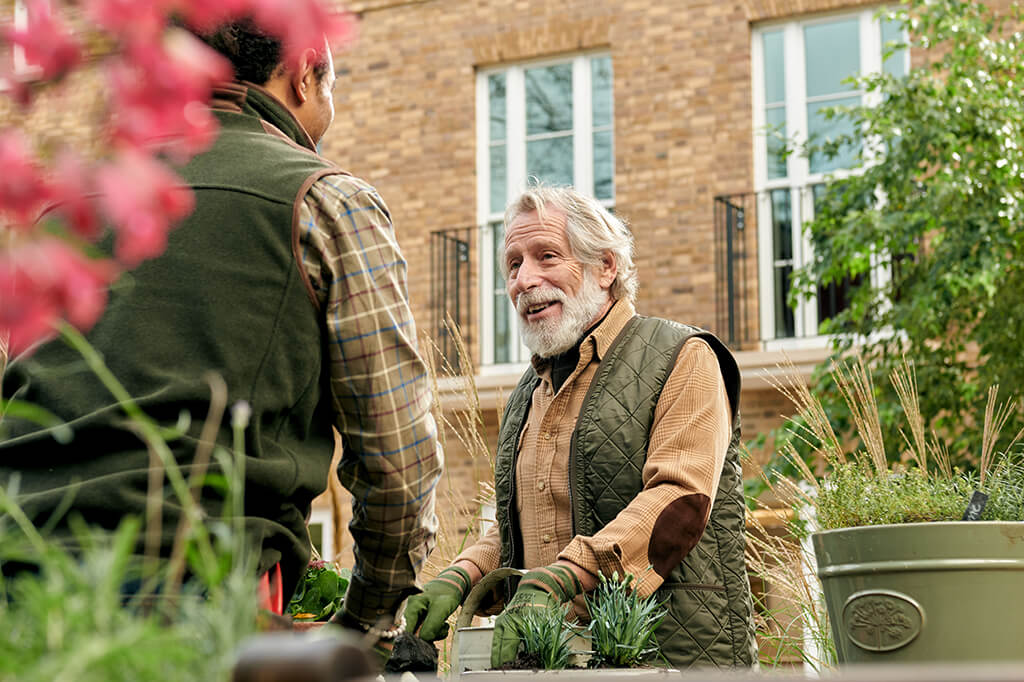Effect of exercise on dementia
At Loveday, we are passionate about providing world-class, life-enhancing care that supports our Members in living an enriched life. A common question we receive from families is: “can lifestyle interventions such as physical activity and mental stimulation for the ageing brain help manage or prevent the onset of dementia?”
The encouraging answer, supported by a growing body of research, is yes. While there is no cure for dementia, regular exercise for cognitive decline and activities that challenge the brain can significantly enhance quality of life, delay progression and support overall brain health.
Physical activity and dementia benefits
Regular physical activity plays a vital role in supporting the health and wellbeing of individuals living with dementia. While cognitive therapies and medications are important, movement-based interventions provide a holistic way to enhance brain function, mood, physical health, and quality of life. The key benefits of physical activity for dementia include:
- Improved blood flow to the brain, supporting memory and cognitive function
- Reduced inflammation and oxidative stress, helping protect brain cells
- Encouragement of neural growth, promoting new brain connections
- Mood enhancement, with increased endorphin levels reducing anxiety and depression
- Stronger social interaction and routine, supporting autonomy and engagement
Low-impact aerobic activities such as walking, swimming and cycling are ideal for older adults, as are balance and strength exercises. At Loveday, we recognise the growing connection between yoga and brain health. Our enriched programme offers a blend of physical and cognitive exercises, combining gentle movement with mindfulness to nourish both body and mind.
One key benefit of exercise for cognitive decline is the positive impact on mood. Physical activity stimulates the release of endorphins, which can alleviate symptoms of anxiety and depression, common co-morbidities in people living with dementia. In turn, this emotional uplift enhances engagement, social interaction and a sense of autonomy.
Mental stimulation for ageing brain
Like muscles that grow stronger with use, the brain also benefits from regular challenge and engagement. Consistent mental activity and brain exercises for elderly health helps to build cognitive reserve- enhancing the brain’s capacity to adapt, compensate and approach tasks through alternative pathways, even in the face of neurological change. This cognitive resilience may delay the onset or reduce the severity of dementia symptoms.
Daily mental stimulation can take many forms. One of the simplest and most enjoyable is reading. Studies have shown that reading and dementia prevention are positively correlated. The act of reading engages multiple areas of the brain, enhances vocabulary, stimulates memory recall and provides a welcome distraction from stress or confusion.
At Loveday, our residences are thoughtfully designed to promote cognitive wellbeing, from well-stocked libraries to structured and engaging workshops and activities like poetry recitals, literary workshops with our Author in Residence Nadia Cohen, storytelling sessions and language lessons that support linguistic and memory functions.
Cognitive games for seniors
Challenging the brain through puzzles, games and new learning opportunities is another effective way to promote mental agility. Cognitive games for seniors such as Sudoku, crosswords, card matching, or even certain video games designed for the elderly, have been shown to support attention, planning and processing speed.
We encourage Members to engage in group-based and individualised cognitive training, tailored to their interests and abilities. These activities are not only mentally stimulating but also support self-confidence and enjoyment- key ingredients for holistic wellbeing.
Incorporating dementia-friendly activities into daily routines also helps reduce anxiety and provides a comforting structure. Gardening, baking, crafting and art making offer cognitive and sensory stimulation without overwhelming demands.
Dementia and social engagement
The social dimension of wellness is often underestimated in discussions about dementia care. Loneliness and isolation are significant risk factors for cognitive decline, which is why it’s important for dementia and social engagement to go hand in hand.
Loveday residences are vibrant spaces where Members are encouraged to connect, converse and share experiences. Whether through shared meals, creative workshops or simply spending time with a favourite pet, social interaction provides mental stimulation, emotional comfort and a reassuring sense of identity.
Peer engagement also reinforces routine and promotes purposeful living-two important factors in dementia care. Our team is trained to create inclusive environments that support both verbal and non-verbal communication, ensuring every Member can participate meaningfully.
Music therapy for memory
One of the most powerful and accessible forms of therapy for those living with memory loss is music. Music therapy for memory taps into areas of the brain that remain relatively unaffected by dementia, often sparking profound emotional and cognitive responses.
Familiar songs can trigger recollections of people, places and emotions, even in advanced stages of dementia. Music supports mood regulation, reduces agitation and can help improve sleep quality. At Loveday, our music therapists curate personalised playlists and host regular sing-alongs and musical performances, all designed to harness the therapeutic power of rhythm and melody.
Music also encourages movement, whether it’s gentle swaying, dancing or playing simple instruments, blending the benefits of both mental and physical stimulation.
Yoga and brain health
Yoga and brain health are increasingly linked in studies examining holistic approaches to dementia care. Yoga not only supports flexibility and balance, reducing the risk of falls, but also incorporates mindfulness practices that can help soothe anxiety, improve sleep and increase mental clarity.
Practising yoga stimulates the parasympathetic nervous system, which helps reduce stress hormone levels. Chronic stress is known to contribute to memory loss and cognitive decline, making yoga an ideal practice for prevention and management.
At Loveday, our specialist-led sessions are adapted to all levels of ability and are often integrated with breathwork and meditation. These classes provide Members with a serene space for introspection, connection and healing.
A holistic approach to dementia care
Understanding the effect of exercise on dementia and the impact of mental engagement allows us to take a proactive, holistic approach to cognitive health. While no intervention can reverse dementia, integrating physical activity, cognitive games for seniors, reading and dementia prevention, and music therapy for memory into daily life can dramatically improve wellbeing.
Loveday is proud to lead the way in pioneering care models that embrace not only the medical but also the emotional, cognitive, and social dimensions of dementia. Through tailored programmes, expert staff, and luxurious surroundings, we empower our Members to lead lives rich in purpose and joy.



